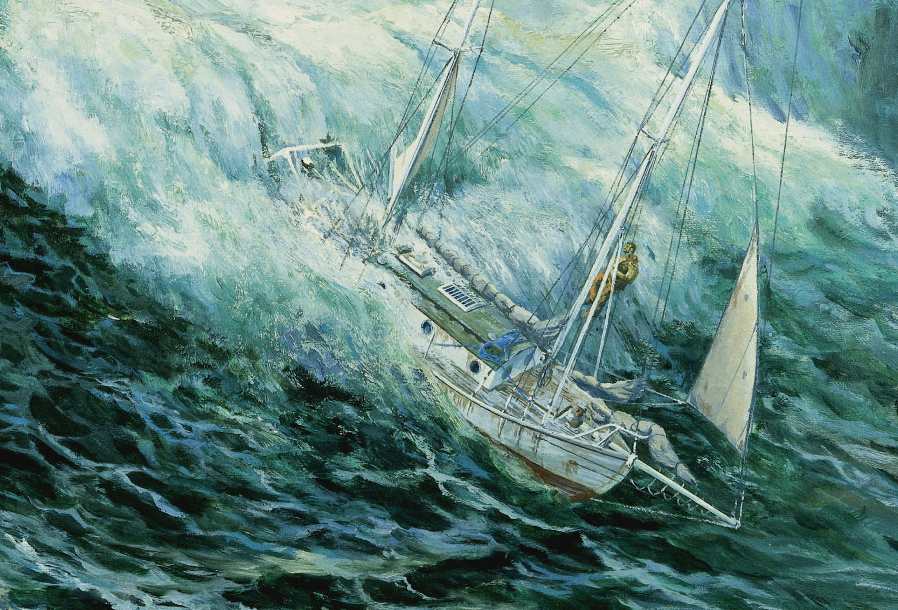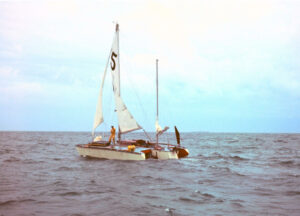
Highlights
- the Golden Globe around-the-world solo sailboat race of 1968
- Its drama continues to echo half a century later because three of the nine competitors became legendary – the one who won, the one who didn’t bother to win, and the one who cheated.

- The Golden Globe Race route reads from the top (England) down and to the right past Africa and Australia, then from the left side across the Pacific and around South America back up to England. Thirty thousand miles; 10 months
- The mariners would navigate like their ancestors, solely by sextant, almanac, chronometer, and nautical chart.

- When the storm abated, he spent a whole day reinforcing the structure that held the cabin to the deck, another day rebuilding the self-steering apparatus, and then three days repairing the rudder.
- If he had not laid in a supply of materials, tools, and fasteners for such tasks, he would have had to quit the race.
- It was his thorough preparation that equipped him to ‘make do and mend’.
- At a point halfway around the world, he had no engine and no radio transmitter.
- “The only way to overcome my present feeling of depression is to fully occupy myself, so I cleaned and served the remaining bottle screw threads and then gave all the servings a coat of Stockholm Tar. Next I polished the vents and gave them a coating of boiled oil. Whilst I had it out I dabbed the oil on wire and rust patches.”
- Doing maintenance cures depression.
- I always considered Donald Crowhurst an absolutely brilliant innovator … but as a businessman, as someone who had to know how the world went, he was hopeless
- Unfortunately, the 35-year-old Crowhurst was too much of an optimist to take into account the complications that always arise between having an idea and getting it to work. The whole rushed process of building and outfitting his trimaran became a nightmare of argument, delay, extra expense, and chaos.
- He over-prepared for what he knew well and under-prepared for nearly everything else.
- Old systems break in familiar ways. New systems break in unexpected ways.

- On his 41-foot trimaran, Donald Crowhurst was the last to start the Golden Globe Race. He hoped the boat’s exceptional speed downwind would let him pass the other racers who had started months earlier.
- The hatch in the cockpit floor leaked and let in a deluge of salt water on the electrical generator, shutting down his treasured radios.
- When he got the generator and radios working again, his brief communications with the world became increasingly vague about where he was exactly.
- In parallel with his accurate logbook, he began writing a second, fraudulent logbook with plausible positions and speed that showed a fictional Crowhurst on track to win the race.
- Lacking the materials for repair, he flouted the race rules, snuck ashore in Argentina, lied to the locals about who he was, repaired the split with their plywood, and headed back to sea, continuing his sporadic cheery reports of rapid progress past Africa, Australia, and South America, disguising his radio signal so it seemed to be coming from those continents.
- Optimists like Crowhurst – and me, I confess – tend to resent the need for maintenance and resist doing it.
- Maybe we prefer to think in ideals, and the gritty reality of everything constantly decaying and breaking offends our sense of the world.
- Toward the end of his trip, when his long-range transmitter was irreparably broken, he decided to convert his short-range radiotelephone to long-range Morse code capability.
- And he succeeded! For a day, he exchanged cables with his backers, his wife, and the BBC.
- Crowhurst had been broadcasting an elaborate lie for seven months.
- By now he was sure he would be found out. He might be received back in England in triumph at first, but once his fake logbooks were examined closely, it would all turn to scandal and disgrace
- Abstraction was the ultimate power.
- “The cabin, after eight months of cramped, unmethodical male housekeeping, smelled as if cabbage juice had been poured over old bedding, allowed to ferment, then baked in a hot oven. Several days’ plates, saucepans, and ripening curry lay in and around the sink; his bed stank.“
- Poor preparation and maintenance led to Crowhurst’s cheat. The cheat led to his death.
- His excessively optimistic view of the world and himself, which had worked fine on land, was lethal for a man alone at sea in an unfit small boat, marinating for months in two contradictory realities.
- He had invested so much of himself in an illusion that when it shattered, he shattered.
- Moitessier had dealt with most of his maintenance issues in advance. Everything about the design and construction of his boat and everything about his outfitting for the race was a result of his decades of learning exactly what it takes for a small boat to thrive in the brutal Southern Ocean.
- He knew that once at sea, the need for maintenance had to be minimal, and doing it had to be easy.
- With money from an admirer, Moitessier had it built of heavyweight steel at a boilerplate factory in France. ‘Ah, steel’, he wrote. ‘Watertight bulkheads, tanks welded right to the hull, incomparable rigidity, welded chain-plates, and an absolutely watertight boat that you clean with a broom and dustpan instead of a bilge pump.’
- The critical maintenance issue with steel is corrosion. The answer, he wrote, is ‘paint, paint, and more paint’.
- ‘Simplicity is a form of beauty.’
- ‘Given a choice between something simple and something complicated’, he wrote, ‘choose what is simple without hesitation; sooner or later, what is complicated will almost always lead to problems’.
- His self-steering gear was easy to repair because it had none of the usual complicated linkages or line attachments. He didn’t bother to install interior heating because, thanks to a watertight cabin, reliably dry clothing would keep him warm enough.
- To substitute for what he described as ‘two or three hundred pounds of noisy radio equipment’, he had a slingshot for launching film canisters containing his messages onto the deck of passing ships.
- His cabin light was a kerosene lantern.
- Moitessier emptied his boat of absolutely everything but the basics. With less stuff, there was less to maintain.
- Thanks in part to his paring down, though he had left England more than two months after Knox-Johnston, he was sailing so much faster he might well catch up.
- His years at sea had taught him that if you don’t fix something when you first see it beginning to fail, it is very likely to finish failing just when it is the most dangerous and the hardest to deal with, such as in the midst of a storm.
- He loved doing routine maintenance.
- His reward for a boat functioning like new every day was this: ‘I spend my time reading, sleeping, eating. The good, quiet life, with nothing to do.’
- “My intention is to continue the voyage, still nonstop, toward the Pacific Islands, where there is plenty of sun and more peace than in Europe … I am continuing nonstop because I am happy at sea, and perhaps because I want to save my soul.”
- So it was Robin Knox-Johnston who won both the Golden Globe and the prize of £5,000 – which he gifted to Donald Crowhurst’s bereaved wife and young children.
- The different maintenance styles of the three sailors led directly to their different outcomes. Knox-Johnston’s style was: “Whatever comes, deal with it.” And he did. Crowhurst’s was: “Hope for the best.” It killed him. Moitessier’s was: “Prepare for the worst.” It freed him. Sir Robin Knox-Johnston won the Golden Globe Race. Bernard Moitessier won the maintenance race.